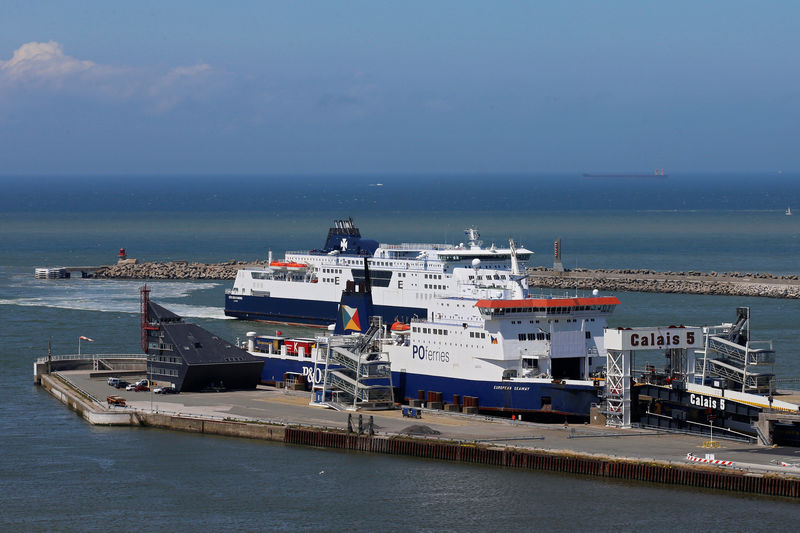 © Reuters. FILE PHOTO: View of cross-Channel ferries in the port of Calais, France, after Britain’s referendum results to leave the European Union were announced
© Reuters. FILE PHOTO: View of cross-Channel ferries in the port of Calais, France, after Britain’s referendum results to leave the European Union were announcedBy Matthias Blamont
CALAIS, France (Reuters) – With construction underway, Jean-Marc Puissesseau may have to rework an 800 million euro (£712 million) project to double the capacity of Calais’ port because of Britain’s exit from the European Union.
The fortunes of France’s busiest passenger port — just 20 miles (33 km) across the water from Britain — hinge on the UK’s future trade ties with the EU, an issue that must be negotiated between now and March next year.
Given Britain has said it will leave the EU’s single market and customs union, with profound implications for customs-free cross-Channel trade as well as Britain’s economy, Puissesseau worries his plans may be overly optimistic.
“The economic model for this new port is based on an increase in traffic,” said the general manager of the port. “It’s a strategic investment for the future of the town.”
His blueprint is based on annual revenue growth of 2 percent. But that prospect looks remote if Britain goes for what’s been dubbed “hard” Brexit and leaves the single market and customs union completely, which would likely reduce the amount of trade through Calais in the short term.
In such a scenario, he would have to substantially modify plans, not least because the port lacks the infrastructure to accommodate customs checks for the 2 million trucks it handles each year.
“If we get a hard Brexit, the whole plan will be at risk because we won’t be able to finance the investment,” he said expressing concern too about the wider impact on the Hauts-de-France region around Calais.
Already one of France’s poorest areas, the fear is that post-Brexit tariffs and a return to a customs border will slow transit times, pushing up the cost of goods and squeezing margins. It could mean traffic being diverted elsewhere.
With unemployment well above the national average of 9.5 percent, officials fret Hauts-de-France will be left further behind. The far-right National Front party has made inroads.
“One has to understand that just two additional minutes for (customs) checks means kilometers of tailbacks,” said Philippe Hourdain, head of the Hauts-de-France Chamber of Commerce. “For us, everything depends on whether we get a hard or soft Brexit.”
CLOSER TO LONDON THAN PARIS
President Emmanuel Macron will hold talks with Britain’s Theresa May in southern England on Thursday, discussing Brexit and the Le Touquet accord, a 2003 agreement that effectively allowed Britain to establish a border in France.
Macron wants Britain to pay a greater share of the financial burden France says it has incurred from dealing with migrants at the frontier and handling more asylum demands.
If Britain and France fail to strike a new deal, the nuclear option for France would be to return to border posts on either side of the Channel, one government source said.
That would further weigh on Hauts-de-France, which in many respects sees its future tied more closely to London than French cities. It’s capital, Lille, is 80 minutes from London by train.
“What’s key for us is that Brexit doesn’t make Britain poorer,” said Jean-Paul Mulot, a London-based adviser to Hauts-de-France leader Xavier Bertrand. “Our position is to do all we can to reinforce the cooperation and investments between the two sides of the Channel.”
On a recent dull, foggy morning in Calais, trade in high street stores was slow. Arcade machines chimed in an empty casino hall and locals nursed early glasses of beer.
No French town has borne the brunt of the European migration crisis more than Calais. In 2016, former president Francois Hollande sent bulldozers to clear a sprawling migrant camp near the port dubbed “The Jungle”, a symbol of the EU’s failure to tackle the influx of refugees and economic migrants from Africa and the Middle East.
Now it is Brexit at the front of people’s minds, even if there are some positive signs for the region, too, with Britain’s Liberty House upping its investment in nearby Dunkirk.
“Everyone talks about Brexit, but no one really knows how it’s going to work out,” said Patrick Genier, a 55-year-old electrical engineer. “What we need is for business to flourish. The jungle is no more, but no one wants Calais to suffer another suckerpunch from Brexit.”
Source: Investing.com




























